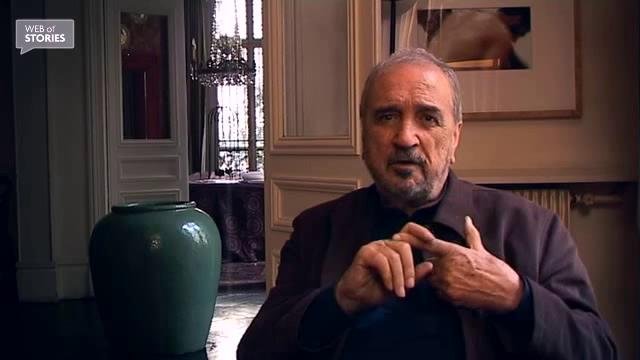NEXT STORY

Creating credible characters
RELATED STORIES

NEXT STORY

Creating credible characters
RELATED STORIES


|
Views | Duration | |
|---|---|---|---|
| 51. The Buddhist perception of the world | 2 | 167 | 02:10 |
| 52. Conversations about the invisible | 153 | 01:21 | |
| 53. What is knowledge? | 144 | 00:59 | |
| 54. Hubert Reeves | 106 | 00:24 | |
| 55. The search for certainty leads only to confusion | 1 | 136 | 03:04 |
| 56. Grasping the absolute | 1 | 113 | 01:28 |
| 57. Creating credible characters | 169 | 00:54 | |
| 58. The new technologies of the 20th century | 149 | 00:52 | |
| 59. A screenwriter must know more than how to write | 1 | 207 | 01:15 |
| 60. Jean-Louis Barrault | 1 | 109 | 02:46 |


Cette un notion de transcendance nous l’avons inventé nous-même parce que nous avons senti depuis très longtemps qu’il y a évidemment des choses qui échappent à notre connaissance. Donc la transcendance est ce que l’esprit par définition ne peut pas atteindre mais dès qu’il a dit ça, l’esprit définît la transcendance, il dit: «C’est divin, c’est la divinité» et la théologie se charge dans ces cas là de qualifier, de décrire même ce qui est le paradis, la vie éternelle, l’enfer etc. Ca, c’est notre aspect très réducteur de l’absolu. Ce que je crois tout simplement… ce qui me semble ce n’est pas ce que je crois, je ne crois rien, il y a un certain nombre des choses que je sais et un grand nombre de choses que j’ignore. Ce que je crois… Ce qui me semble c’est que notre esprit fait des efforts désespérés pour connaître, et que dans certains domaines, il n’y arrive pas. Dans mon domaine à moi, c’est très simple, la vérité que je cherche c’est une vérité dramatique. Elle concerne les personnages que je mets en scène, que je décrits. Je cherche à leurs donner de la vie d’abord et de la vérité ensuite. C’est quelque chose qui soit en même temps acceptable, je n’ai pas du tout la prétention de dévoiler les secrets de la matière ou des univers les plus lointains. Dans ces domaines-là c’est peut-être possible d’atteindre quelque chose qu’on pourrait appeler une petite vérité, «en passant».
That notion of transcendence we invented ourselves because we felt that things would slip away from our knowledge. So transcendence is by definition what the mind can't reach, but at the same time as soon as this is said the mind defines transcendence and states, 'it is divinity' and theology takes it on itself to qualify and describe what is paradise, eternal life, hell, etc. That is our very reductive approach to the absolute. I believe that... it seems to me rather - because I don't believe in anything - there is a vast amount of things I know and a vast amount of things I don't know... it seems to me... that our mind makes desperate attempts to know, and in certain areas, it doesn't achieve that goal.
In my own area it is very simple: the truth I look for is the dramatic truth. It is about the characters I create and describe. I try to give them life first, then some truth. It is something that is acceptable, I don't have any pretension about revealing the secrets of matter or of the universe. In those areas, it may be possible to reach a small truth en passant.
French screenwriter Jean-Claude Carrière (1931-2021) began his association with films aged 24 when he was selected by Jacques Tati to write for him. This early experience led to further contact with other film-makers, including Luis Buñuel with whom Carrière collaborated for many years. He wrote screenplays for films including Belle de Jour, The Discreet Charms of the Bourgeoisie, Tin Drum and Danton.
Title: Grasping the absolute
Listeners: Andrzej Wolski
Film director and documentary maker, Andrzej Wolski has made around 40 films since 1982 for French television, the BBC, TVP and other TV networks. He specializes in portraits and in historical films. Films that he has directed or written the screenplay for include Kultura, which he co-directed with Agnieszka Holland, and KOR which presents the history of the Worker’s Defence Committee as told by its members. Andrzej Wolski has received many awards for his work, including the UNESCO Grand Prix at the Festival du Film d’Art.
Tags: Transcedence, theology
Duration: 1 minute, 28 seconds
Date story recorded: January 2010
Date story went live: 18 October 2010